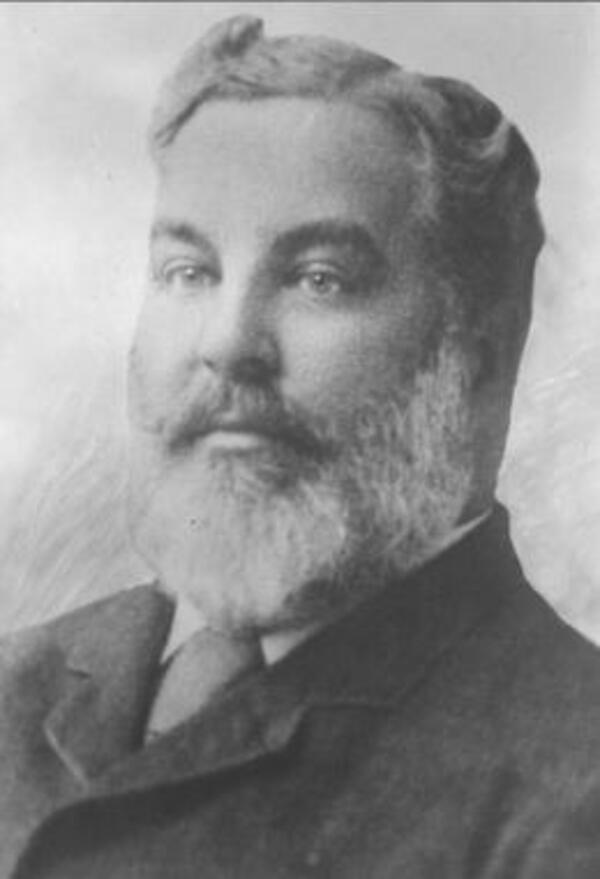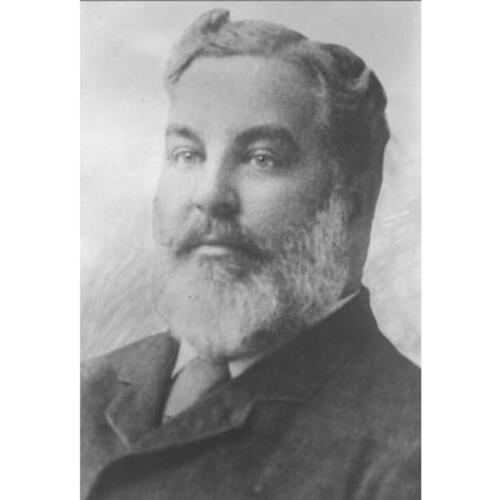
Source: Link
GOLDIE, THOMAS, businessman, politician, and sportsman; b. 9 July 1850 in Paterson, N.J., eldest son of James Goldie and Frances Owen; m. 1877 Emma Jane Mitchell in Nova Scotia, and they had two sons and three daughters; d. 2 Feb. 1892 in Guelph, Ont.
Thomas Goldie’s grandfather, John Goldie, a renowned Scottish botanist, toured Upper Canada and the northeastern United States in 1817–19 and immigrated to Ayr, Upper Canada, in 1844. Thomas’s parents, who had stayed in Scotland, came to the United States shortly before his birth; in 1860 they settled in Guelph, where James established a lucrative enterprise, the James Goldie Milling Company.
Upon completing his education in Guelph, Thomas attended McGill College in Montreal and Eastman’s National Business College in Poughkeepsie, N.Y. He later joined his father’s business, becoming manager. As well, he was instrumental in the inception of the Guelph Junction Railway, which began construction in 1886, and he later served as a director. According to an account in 1906, he acted as a director of the Gore Fire Insurance Company, as vice-president of both the Canadian Millers Mutual Fire Association and the Wellington Mutual Fire Insurance Company, and as president of the Millers and Manufacturers Insurance Company. Goldie remained active in the family business, and was president of the Dominion Millers’ Association at the time of his death in 1892.
Goldie took an earnest interest in public life in Guelph. He sat on the school board, and from 1881 to 1890 he served as an alderman. In 1891 he won the mayoralty by more than 500 votes and was returned by acclamation the following year. One of the community’s most popular 19th-century mayors, he was quite modern in his approach to the needs of the city; during his administration Guelph hired its first city engineer. Goldie also served as president of the Liberal-Conservative Association of South Wellington (1888–92). He was a charter member of Guelph Lodge No.163 of the Order of United Workmen in 1882, served on the board of management of Knox Church (Presbyterian), and was a member of the Sons of Scotland.
Goldie’s greatest acclaim probably came for his long-time participation in and promotion of amateur field sports in Ontario. Although he enjoyed shooting and angling, he was better known as a baseball, lacrosse, and cricket enthusiast. During the heyday in the 1870s of Guelph’s Maple Leaf Base Ball Club, he was its secretary. In 1869 it had won the Canadian championship and in 1874 it won the United States–Canada championship in Watertown, N.Y. Goldie’s brother John was one of the team’s star players during the early years. Thomas and the club’s president, George Sleeman*, a prominent brewer and future mayor of Guelph, were eager to capitalize on the popularity of the game to boost the image of the city. Their interest in associating sport with civic promotion was typical, according to sports historian William Humber, of an era “when leagues meant little, and the size of a town meant less than the promotional elan of some local patron who wanted to put his town on the map.” During the early days of baseball in Guelph, the sport reflected the varied social composition of the city. It was a great social equalizer as young men from prominent and privileged families, such as Goldie’s sons, played with those from families with less means. The Guelph champions of 1869 included “locally born machinists, as well as a butcher, a tinsmith, a miller, and a Methodist clergyman.” By the mid 1880s, however, the club was facing financial trouble in the semi-professional circuit, its glory days overshadowed by retirement of players and narrowing profit-margins. Sleeman was forced to disband the team in 1886.
As the baseball club was experiencing difficulty, other sports, notably lacrosse, cricket, curling, horse-racing, and speed-skating, were gaining in popularity. Goldie was a keen supporter of lacrosse after it was organized in Guelph in 1884. His personal reputation as an athlete was won in cricket, which remained his favourite sport. He had been an active player in his youth and also played as a member of Toronto’s Albany Club. In 1891 he was the star of the annual match in Guelph that pitted the municipal council against the school board. Goldie’s interest in the sport led him to the provincial level. He was president of the Ontario Cricket Association in 1892 when he became fatally ill with pneumonia. He died in February of that year at the age of 41.
Thomas Goldie’s contributions to the sporting, business, and municipal life of Ontario were warmly remembered in tributes published in Toronto and Guelph newspapers, which praised him for his amiable nature, generosity, and public service. The Toronto World affectionately described him as “one of Toronto’s most welcome visitors. . . . None was more fond of him than the Queen City Cricketeers. And there was ample reason for it. He was a staunch supporter of the grand old game. It was in his heart and he dearly loved the willow and the wickets.”
Guelph Public Library (Guelph, Ont.), Goldie papers, Roswell Goldie scrapbook. UWOL, Regional Coll., George Sleeman papers. Woodlawn Cemetery (Guelph), Records for Goldie family plot. Globe, 4–5, 16 Feb. 1892. Guelph Herald, 1860–71, and Guelph Daily Herald, 1871–92, esp. 4 Feb. 1892. Guelph Weekly Mercury, 1860–67, and Guelph Daily Mercury and Advertiser, 1867–92, esp. 21 Aug. 1891, 4, 6, 8 Feb. 1892. Historical atlas of the county of Wellington, Ontario (Toronto, 1906); repr. as Illustrated historical atlas of Wellington County, Ontario (Belleville, Ont., 1972). William Humber, Cheering for the home team: the story of baseball in Canada (Erin, Ont., 1983). L. A. Johnson, History of Guelph, 1827–1927 (Guelph, 1977). Guelph Evening Mercury, centennial ed., 20 July 1927. James O’Mara, “The provincial riding of Wellington South, 1867 to present,” Historic Guelph, the Royal City (Guelph), 23 (1983–84): 51–69.
Cite This Article
Debra L. Nash-Chambers, “GOLDIE, THOMAS,” in Dictionary of Canadian Biography, vol. 12, University of Toronto/Université Laval, 2003–, accessed February 26, 2026, https://www.biographi.ca/en/bio/goldie_thomas_12E.html.
The citation above shows the format for footnotes and endnotes according to the Chicago manual of style (16th edition). Information to be used in other citation formats:
| Permalink: | https://www.biographi.ca/en/bio/goldie_thomas_12E.html |
| Author of Article: | Debra L. Nash-Chambers |
| Title of Article: | GOLDIE, THOMAS |
| Publication Name: | Dictionary of Canadian Biography, vol. 12 |
| Publisher: | University of Toronto/Université Laval |
| Year of publication: | 1990 |
| Year of revision: | 1990 |
| Access Date: | February 26, 2026 |



